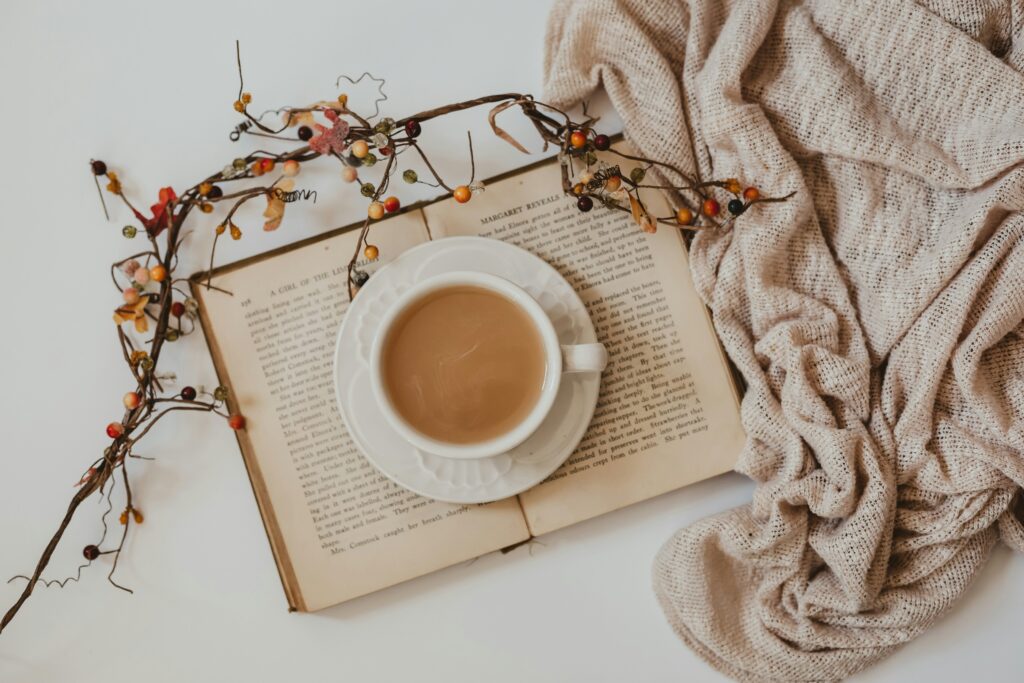Many of us enjoy a cup of tea or coffee and perhaps a cigarette or glass of wine too. These are some of life’s little pleasures! But if you have trouble with your sleep, caffeine, alcohol, and nicotine can disrupt it. In this blog post, I’ll look at how they affect sleep and how to enjoy more restful nights.

Caffeine: Yes, caffeine can affect your sleep
We all know caffeine is in tea and coffee and it’s a favourite morning drink for many of us (me included). Did you know that there is caffeine in green tea, chocolate, fizzy drinks (soda) & energy drinks? Caffeine is also added to many cold and flu and pain killer medications. And it is rarely clear how much caffeine is in our daily cuppa. Coffee can vary hugely in the amount of caffeine it contains and there is no standard ‘unit’ of caffeine unlike, for example, a unit of alcohol (here in the UK).
When I work with clients, I never tell someone to give up their morning tea or coffee. But we do take a look at what and when caffeine is being consumed to minimise any disruption to sleep.
The Science Behind Caffeine and Sleep
Caffeine is the world’s favourite psychoactive stimulant drug. ‘Psychoactive’ means that it changes how we think and feel and ‘stimulant’ means it’s a central nervous system stimulant that increases alertness. It works by blocking adenosine, a neurotransmitter responsible for producing sleep and relaxation. When adenosine is blocked, you feel more awake and alert. So you have more trouble getting to sleep and staying asleep.
For most of us, caffeine stays in our blood for 4-6 hours before it reduces by half (called a ‘half-life’). This means that an expresso at 6pm would still have half of its caffeine in your blood at 10pm-12pm. No one would drink half an expresso before bedtime! And if you eat or drink caffeine during the day too, then the residual caffeine from that will also still be in your blood. It’s worth remembering too that we all breakdown caffeine in our bodies at our own rate and it can take longer than the average 4-6 hour half-life.
Timing Matters
To avoid sleep disturbances, watch your caffeine intake, especially in the afternoon and evening. For some people, even consuming caffeine six hours before bedtime can disrupt sleep. So, that late-afternoon espresso might not be such a great idea.
Anxiety and Caffeine
If I have a client that struggles with anxiety, I also recommend a very reduced caffeine intake. This is because caffeine can increase the feelings and sensations associated with anxiety (such as increased heart rate, jitters, racing mind). There have been studies that show that caffeine, especially in higher doses, can aggravate symptoms of anxiety and panic disorder. Caffeine has also been found to increase the stress hormone, cortisol. The fact is that some people are more sensitive to the effects of caffeine than others, so it’s very much an individual thing.
Alcohol: Makes you sleepy but you’ll sleep badly
While alcohol may initially make you feel drowsy, it can lead to fragmented, poor-quality sleep later in the night. This is why reaching for a night cap to help you sleep at night can be doing more harm than good.
The Science Behind Alcohol and Sleep
Alcohol is a sedative, which means it has a slowing effect on the central nervous system which can make you feel relaxed and sleepy. However, as your liver metabolizes alcohol, it can have stimulating effects, leading to awakenings during the night and lower quality sleep overall.
Moderation is Key
To minimise the effect on sleep, if you choose to enjoy an alcoholic drink, do so in moderation and try to finish drinking at least a few hours before bedtime. This allows your body more time to metabolize the alcohol, reducing its impact on your sleep.
Nicotine: can cause poor quality sleep
Nicotine, found in tobacco, e-cigarettes and nicotine gum, is another culprit that can keep you awake at night.
The Science Behind Nicotine and Sleep
Nicotine is a highly addictive stimulant (that is, a central nervous system stimulant that increases heart rate and blood pressure) leading to heightened alertness. It can also disrupt the natural sleep-wake cycle, leading to trouble getting to sleep, staying asleep and poorer sleep quality.
The Smoking Paradox
While many smokers rely on cigarettes to relax, nicotine can actually exacerbate sleep problems. Quitting smoking or avoiding nicotine-containing products, especially before bedtime, can significantly improve sleep quality.
Conclusion: How to sleep better
Understanding the effects of caffeine, alcohol, and nicotine on sleep is the first step towards better sleep. To ensure restful nights:
– Be mindful of your caffeine intake, especially in the afternoon.
– Limit alcohol, particularly in the hours leading up to bedtime.
– If you smoke, consider quitting or avoid nicotine close to bedtime (this includes gum and patches).
By making these adjustments, you can enjoy more restful sleep for better health and well-being. Remember, quality sleep is a vital component of a healthy lifestyle and making these changes can help you achieve just that. Read here for more Sleep Tips in Menopause.
Socials